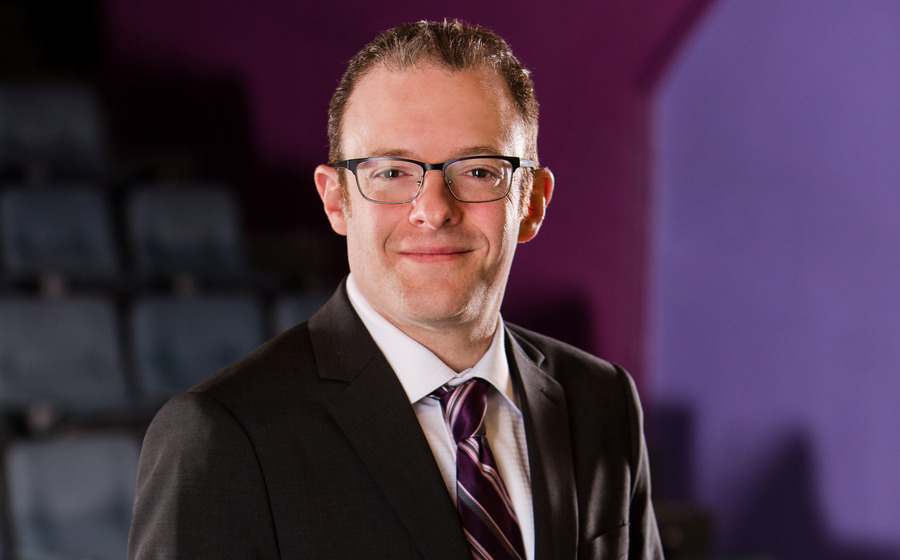BOSTON: The Huntington Theatre Company has announced the appointment of Christopher Mannelli as its new executive director. Succeeding the company’s founding executive director, Michael Maso, after his 41 years in the role, Mannelli will start on a full-time basis on Nov. 6, after leaving the same role at Geva Theatre Center in Rochester, N.Y., where he’s served since 2016.
“I am thrilled to welcome Chris and his family to Boston and to have the opportunity to have such a mindful partner in mapping out the Huntington’s extraordinary plans for the future,” said the Huntington’s artistic director, Loretta Greco, who started at the job in early 2022, in a statement. “With his deep commitment to building an equitable organizational culture, I am certain he will inspire our wonderful staff and board, while also engaging and strengthening our impact through the work on our stages, in classrooms, and throughout our community.”
Mannelli’s 20-plus years as an arts administrator and producer include several years in Chicago, where he served as deputy director of the Tony-winning Chicago Shakespeare Theater and managing director of Victory Gardens Theater. His first job in a similar role was at St. Louis’s HotCity Theatre. At the Huntington, Mannelli said he’s especially keen on the work the theatre does in its Calderwood Pavilion space, where they produce as well as present the work of other local companies, including a multi-year residency by the Front Porch Arts Collective. “Supporting the local ecosystem is not something every theatre does,” he said, “and it’s a little bit similar to what we did at Victory Gardens when we had our resident theatre program in our smaller space there.”
In his seven years at Geva, Mannelli oversaw a $10 million capital campaign as well as the renovation and modernization of its historic theatre complex. At the Huntington, he’ll take over a historic theatre that has just had a $58 million restoration, and for which a $13 million second phase—including an expanded lobby and public space—is planned for the 2025-26 season. The key to the new space, Mannelli said, is that it’s “not just for the audiences we have now, but for the audiences that we envision for the future. How do we really connect with the community in that space? That’s really thrilling to walk into.”
Mannelli was a leader in the Geva’s anti-racism efforts, and it’s a focus he’s also intent on at the Huntington.
“One of the things that drew me to the organization was that it was clear they had been doing the work, and that they were committed to taking action and making change, not just putting things up on a website,” Mannelli said. “How do we break down the history of the American theatre in the United States and the structures we had before, and make it something that is more equitable and welcoming to the folks that we really want to have? One of my jobs is to create opportunity and make sure that there are more folks that might not have had the chance before to do the kind of work that I’m doing.”
Though he worked previously at Chicago Shakes, which has an eight-figure budget, his new job represents a step up in scale, from the Geva’s $8.5 million budget to the Huntington’s approximately $20 million. “The job doesn’t change that much,” he said. “There’s just a little more complexity.”
Asked about renewed concerns about the state of the theatre field and the nonprofit business model more generally, Mannelli said, “The piece of the model that I don’t think is broken is trying to make sure we continue to have access for people so that not every ticket is $300.” He identified “two things that are going to be really critical for theatre as we’re going forward. One is how we’re thinking about developing our audiences, and what it’s going to take to connect with folks who aren’t engaged with the theatre right now. We certainly have a lot of aspiration to connect with lots of different groups of folks, but to be innovative on how we do that, and to meet folks on their own terms—I think that’s where some of the work is.”
And the second thing? “There are probably some lessons to learn in our industry—and this is not to demean anyone doing this work—about how we can up our game in fundraising,” he continued. “If we look at hospitals or universities, which have highly developed, professionalized fundraising departments—I think we probably need to step things up a bit in that way. I do think there’s a case to be made for theatre that is just as strong as those other places.”
Mannelli’s appointment culminated a six-month national search, led by a 14-person search committee made up of Huntington board members and staff representatives, chaired by Huntington chairman Randy Peeler and president Neal Balkowitsch, and working with consultant Tom Hall of AlbertHall & Associates. Mannelli plans to participate in key Huntington events this fall, then relocate to Boston and join the company full time in November. He noted that his two kids will complete the 2023-24 school year in Rochester before joining him in Boston.
The Huntington bills itself as Boston’s theatrical commons and leading professional theatre company.


